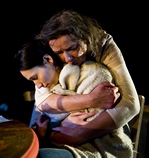SITE GUIDE
SEARCH
REVIEWS
REVIEW ARCHIVES
ADVERTISING AT CURTAINUP
FEATURES
NEWS
Etcetera and
Short Term Listings
LISTINGS
Broadway
Off-Broadway
NYC Restaurants
BOOKS and CDs
OTHER PLACES
Berkshires
London
California
New Jersey
DC
Connecticut
Philadelphia
Elsewhere
QUOTES
TKTS
PLAYWRIGHTS' ALBUMS
LETTERS TO EDITOR
FILM
LINKS
MISCELLANEOUS
Free Updates
Masthead
Writing for Us
A CurtainUp  London Review
London Review
 London Review
London ReviewRoad to Mecca
by Neil Dowden
|
There is more light in you than in all your candles put together. — Marius Byleveld
|

Sian Clifford as Elsa and Linda Bassett as Miss Helen (Photo: Idyl Sukan) |
Inspired by the eccentric, visionary sculptor Helen Niemand, whose home The Owl House is now a museum, the play is set in a remote village in the Karoo Desert. The young radical English teacher Elsa (Sian Clifford) drives 12 hours from Cape Town to stay with her septuagenarian friend Miss Helen (Linda Bassett) for just one night. Though having just broken up with her married lover and facing disciplinary action at her school, Elsa has come in response to a letter from Miss Helen in which she complained of depression and even talked about suicide.
The local pastor Marius (James Laurenson), who has been increasingly concerned about Miss Helen's welfare since she withdrew from village life when she stopped coming to church after her husband died 15 years ago and started to make a series of unusual, 'idolatrous' statues in her house, also visits in an attempt to persuade her to enter an old people's home. The clash between him and Elsa over Miss Helen's future prompts some dramatic revelations.
The great success of The Road to Mecca is Fugard's imaginative ability to show us the different viewpoints of these well-rounded protagonists so that our sympathies fluctuate between them as we find out more. Although the close friendship between Miss Helen and Elsa, in which the generational mother/daughter relationship is sometimes inverted, is built up skilfully, the play really comes to life when Marius arrives and a shifting triangular dynamic is established.
The tensions between religious faith and artistic creativity, community pressure and non-conformist individual, and institutional dependence and maverick autonomy, are powerfully conveyed, but it is Fugard's deep and wide compassion which shines through. And although this is not one of his 'anti-apartheid plays', the socio-political context is deftly suggested through descriptions of the plight of two off-stage black women.
Russell Bolam directs with subtlety so that the nuanced development of character and theme are well realized. Ruth Hall's design evokes the idiosyncratic nature of Miss Helen's home, full of mirrors and candles, while David Holmes's lighting adds much to the changing moods of the drama. There is a magical moment when myriad small lights are switched on behind the gauze curtains surrounding the audience to represent Miss Helen's inner luminosity.
Linda Bassett gives a superbly convincing performance as Miss Helen, catching both her childlike joy and her ageing vulnerability, as well as her spiritual enlightenment and lonely confusion. James Laurenson is also excellent as Marius, a born-again Christian who sincerely believes in helping others achieve the salvation he has found, but who considers freedom of expression a dangerous self-indulgence. Sian Clifford brings a feminist, reforming zeal to her forceful portrait of Elsa, while showing her inability to sort out her own personal problems.
Overall, the Arcola's Fugard mini-festival is a fine tribute to one of the greatest living English-language playwrights.
|
Subscribe to our FREE email updates with a note from editor Elyse Sommer about additions to the website -- with main page hot links to the latest features posted at our numerous locations. To subscribe,
E-mail: esommer@curtainup.comesommer@curtainup.com
put SUBSCRIBE CURTAINUP EMAIL UPDATE in the subject line and your full name and email address in the body of the message -- if you can spare a minute, tell us how you came to CurtainUp and from what part of the country. |
| The Road to Mecca
Written by Athol Fugard Directed by Russell Bolam Starring: Linda Bassett, James Laurenson, Sian Clifford Design: Ruth Hall Lighting: David Holmes Music: Gary Yershon Sound: Tom Gibbons Running time: Two hours thirty minutes (including interval) Box Office: 020 7503 1646 Booking to 10 July 2010 Reviewed by Neil Dowden based on June 23rd 2010 performance at the Arcola Theatre, 27 Arcola Street, London E8 2DJ (Train: Dalston Kingsland) |
|
REVIEW FEEDBACK Highlight one of the responses below and click "copy" or"CTRL+C"
Paste the highlighted text into the subject line (CTRL+ V): Feel free to add detailed comments in the body of the email . . . also the names and emails of any friends to whom you'd like us to forward a copy of this review. |
|
London Theatre Tickets Lion King Tickets Billy Elliot Tickets Mighty Boosh Tickets Mamma Mia Tickets We Will Rock You Tickets Theatre Tickets |




